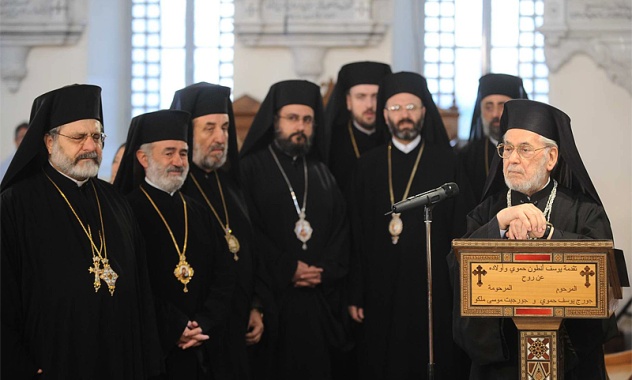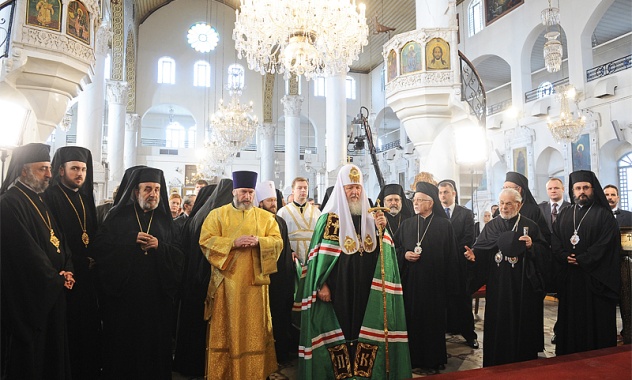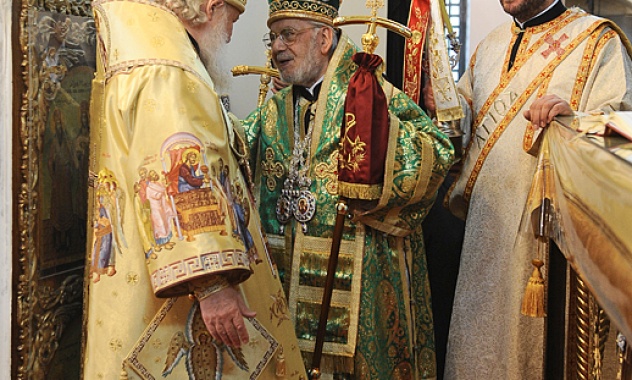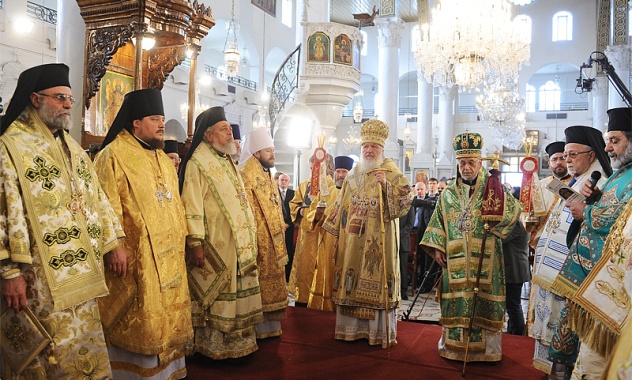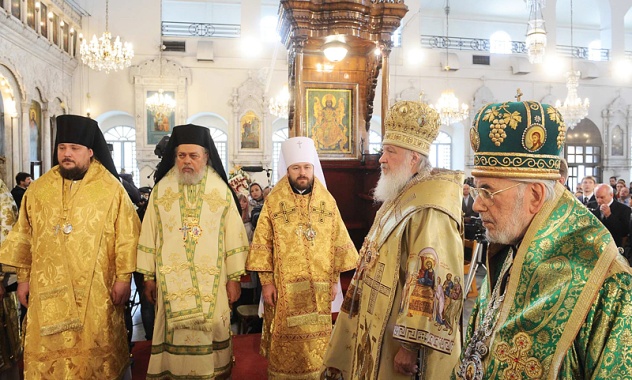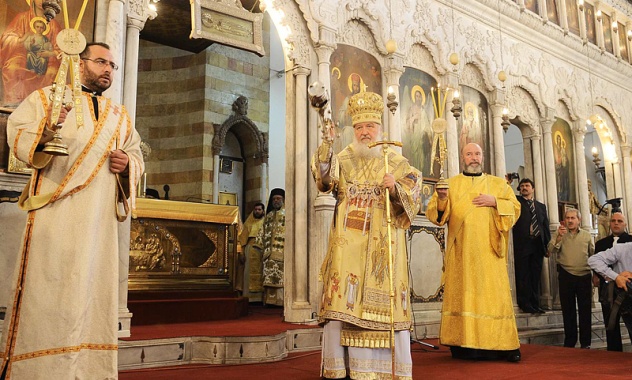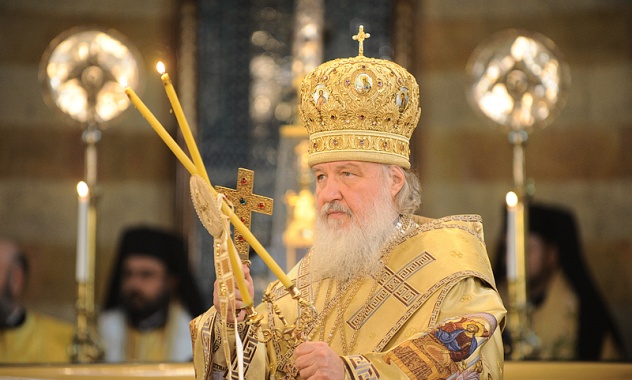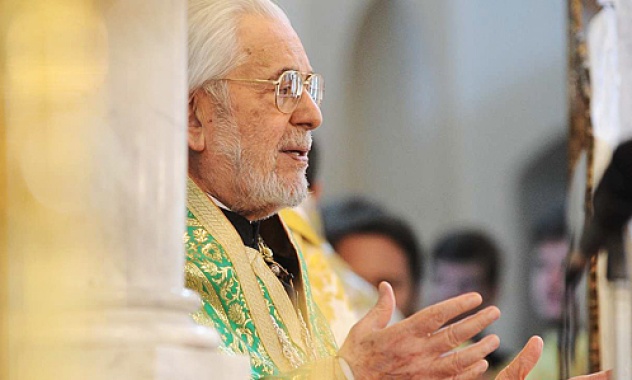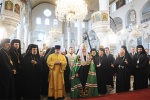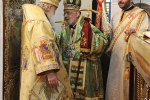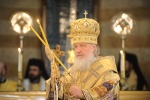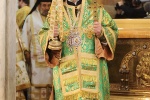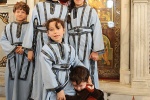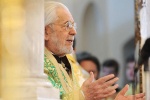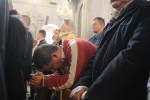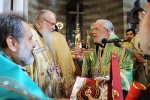Primates of the Antiochian and Russian Orthodox Churches celebrate at the Cathedral of the Assumption in Damascus
On 13 November 2011, His Holiness Patriarch Kirill of Moscow and All Russia and His Beatitude Patriarch Ignatius of Antioch and All the East officiated at the Divine Liturgy at the Cathedral of the Assumption in the capital of Syria. The service was celebrated in the Arabic and Church Slavonic languages.
Concelebrating were hierarchs of the Patriarchate of Antioch: Metropolitan Antonio of Mexico; Metropolitan Damaskinos of São Paulo and Brazil, Metropolitan George of Homs; Metropolitan Paul of Aleppo and Iskandaroun; Metropolitan Saba of Houran and the Mountain of the Arabs; Archbishop Nifon of Philippopolis, representatives of the Patriarch of Antioch and All the East to the Patriarch of Moscow and All Russia; Bishop Demetrios of Safita; Bishop Mark of Sergiopolis; Bishop Ghattas of Qara; and Bishop Lukas of Seidnaya. Also taking part in the service were the following representatives of the Russian Orthodox Church: Metropolitan Hilarion of Volokolamsk, chairman of the Moscow Patriarchate’s Department for External Church Relations (DECR); Bishop Sergiy of Solnechnogorsk, head of the Moscow Patriarchate’s Administrative Secretariat; archpriest Nikolai Balashov, DECR deputy chairman; archimandrite Alexander (Yelisov), representative of the Patriarch of Moscow and All Russia to the Patriarch of Antioch; and protodeacon Vladimir Nazarkin, assistant to the DECR chairman.
The cathedral was filled to the capacity; Syrian TV channels broadcast the service live.
Attending the liturgy were the ambassadors of the Russian Federation and Belarus; charges d’affaires of Ukraine and Bulgaria; representatives of the Syrian Jacobite and the Armenian Apostolic Churches.
Orthodox scouts and children vested in dalmatics participated in the Little Entrance.
The Gospel was read in the Church Slavonic and Arabic languages.
His Beatitude Patriarch Ignatius greeted His Holiness Patriarch Kirill, saying: ‘While welcoming the Patriarch of the Russian Orthodox Church, we recall that the Russian Orthodox Church had been discriminated during seventy years, but nobody was able to break her.’ His Beatitude reminded the worshippers of profound ties between the Churches of Antioch and Russia and thanked the Russian people for their help with educating the citizens of Syria. (In the 19th century, the Imperial Orthodox Palestinian Society opened schools with lessons in the Arabic language; the programme of education is being continued). The Primate of the Orthodox Church of Antioch underscored. ‘Patriarch Kirill is the head of the greatest Church in the world. She never had a feud with people of other faiths. I am happy to thank You, my dear brother, Russia, and Russian people.’
Patriarch Ignatius presented the Order of Ss Peter and Paul, the highest award of the Orthodox Church of Antioch, to His Holiness Patriarch Kirill.
His Holiness Patriarch Kirill said that the Churches of Antioch and Russia have maintained relations for many centuries and added, ‘The Church of Antioch and the people of Syria are undergoing severe trials, and I wished to be and pray with you and inspire you with fresh strength by my modest words. I believe that the Lord will be merciful to the people of Syria and to the Church of Antioch; justice will triumph; and people will solve their internal problems and achieve their noble goals of consolidating society and civil peace and overcoming confrontation through dialogue and mutual understanding. I wholeheartedly wish you success in creating a new Syria, a peaceful and open to all state, in which freedom of religion is respected and Christians and Moslem live in peace as it used to be. May God save this land from interreligious enmity. May the Lord bless Syria in these hard days, support your people, and grant wisdom to those responsible for the destiny of the state.”
His Holiness Kirill greeted His Beatitude Patriarch Ignatius, saying: ‘You are leading the Orthodox Church of Antioch, the eldest religious community in this land. I wish you spiritual and physical strength, support of your clerics, bishops and laymen so that together you can facilitate the revival of life of the people of Syria.
‘I bring you love from the Russian people, the martyrs who had experienced terrible ordeals in their history. One of them was the Civil War in the early 20th century. We split our society and our nation. We killed one another for the sake of a happy life in future. Yet, it is impossible to have a happy life on the blood. It was only when we have united the forces of all people and reconciled with one another, we began to cherish the hope for the renewal of our life. Resting on our experience, we address you, dear brothers and sisters, with an appeal to overcome differences peacefully. Unite and become strong again in order to solve any problem. May God’s blessing be with you always.’
The Primate of the Russian Orthodox Church presented His Beatitude Ignatius with the pectoral cross and two panagias – the symbols of patriarchal dignity and donated liturgical vessels to him as a special gift from Russian people.
His Holiness Patriarch Kirill’s address was several times interrupted by applause and exclamations of the worshippers who expressed their gratitude to the Russian Church.
A ceremony of official greetings took place at the Throne Hall of the Patriarchate after a solemn procession from the Cathedral of the Assumption. In his response to Patriarch Ignatius’ welcoming speech, the Primate of the Russian Orthodox Church said: ‘Our nations and Churches have been united by deep and strong ties. I am happy to be here at a difficult time for the people of Syria, and I take my visit as a manifestation of God’s will. I wholeheartedly wish wisdom and courage to You, Your Beatitude, and to the bishops of the Church of Antioch.’
Patriarch Kirill presented panagias to all celebrating bishops of the Patriarchate of Antioch, and decorated crosses to the archimandrites.
His Beatitude Patriarch Ignatius presented the Order of Ss Peter and Paul, the highest award of the Church of Antioch, to Metropolitan Hilarion and Bishop Sergiy (2nd class) and to archpriest Nikolai Balashov and protodeacon Vladimir Nazarkin (3rd class).
Other events
-
17.11.2011 17:43(Russian) «Интерпретация поездки Патриарха Кирилла в Сирию как поддержки режима Асада безосновательна»
-
16.11.2011 12:43His Holiness Patriarch Kirill completes his official visit to the Patriarchate of Antioch
-
16.11.2011 10:43Primate of the Russian Orthodox Church addresses faculty and students of the University of Balamand
-
16.11.2011 09:59Primate of the Russian Orthodox Church visits Balamand Monastery in Lebanon
-
16.11.2011 03:11His Holiness Patriarch Kirill meets with Maronite Patriarch Béchara Boutros Raï
-
15.11.2011 15:59(Russian) Состоялась встреча Святейшего Патриарха Кирилла с представителями ливанской государственной власти и общественности, отмеченными наградами Русской Православной Церкви
-
15.11.2011 02:50Patriarch Kirill meets with President of Lebanon
-
14.11.2011 23:53Patriarch Kirill celebrates thanksgiving at St. George’s in Beirut
-
14.11.2011 16:19Patriarch Kirill arrives in Lebanon
-
14.11.2011 16:05(Russian) Состоялась встреча Святейшего Патриарха Кирилла с Верховным муфтием Сирии и министром вакуфов Сирийской Арабской Республики
-
14.11.2011 12:28His Holiness Patriarch Kirill meets with President of Syria Bashar al-Assad
-
14.11.2011 03:16(Russian) Святейший Патриарх Кирилл принял участие в открытии фотовыставки, посвященной взаимоотношениям Антиохийского Патриархата и Русской Православной Церкви, и презентации издания книги «Свобода и ответственность» на арабском языке
-
13.11.2011 22:30Primates of the Antiochian and Russian Orthodox Churches celebrate at the Cathedral of the Assumption in Damascus
-
13.11.2011 20:15Primate of the Russian Orthodox Church meets with Prime Minister of Syria Adel Safar
-
13.11.2011 16:47His Holiness Patriarch Kirill meets with compatriots in Damascus
-
13.11.2011 01:58(Russian) Слово Святейшего Патриарха Кирилла на молебне в Успенском соборе Дамаска
-
12.11.2011 22:55(Russian) Святейший Патриарх Кирилл посетил Успенский кафедральный собор Дамаска
-
12.11.2011 15:57(Russian) Начался официальный визит Святейшего Патриарха Кирилла в Антиохийский Патриархат
-
11.11.2011 13:17Patriarch Kirill goes on official visit to the Patriarchate of Antioch







